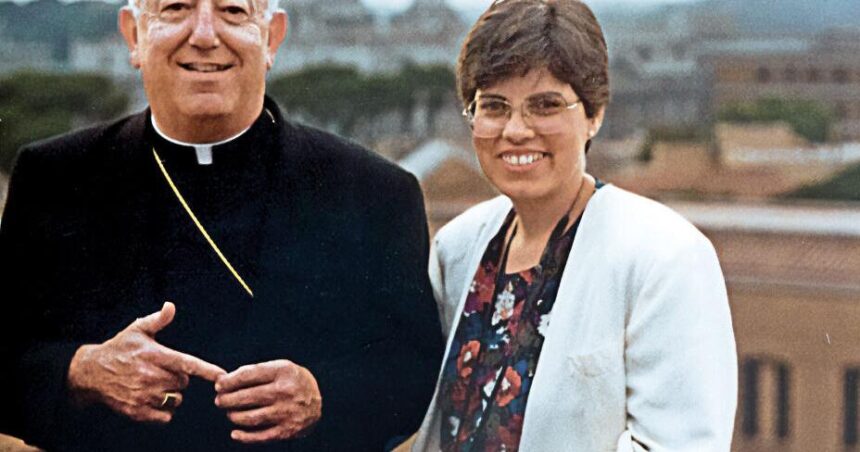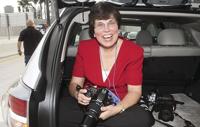MIAMI | Back in the summer of 1979, a year before my college graduation, I got my first professional job in journalism. I was hired as a summer intern, to serve as interim editor of La Voz Católica.
That meant filling four pages of news every week, reporting, writing, and editing in Spanish. My first thought: I can do this! (I had been a reporter and editor for my high school and college papers.)

Archbishop John C. Favalora and Florida Catholic editor Ana Rodriguez-Soto in Rome after the pallium ceremony for new archbishops, June 1995.
My first day on the job, I called my mother to tell her I had reached the pinnacle of my aspirations: I had a desk, a phone, a typewriter (yes, an old – even then – Royal, Google “His Girl Friday” for reference); and to top it all off, I was getting paid to read and write news.
More than 40 years later, that feeling of joy and fulfillment has never left me. And I also never left the archdiocesan newspapers.
Asked to return after graduation in 1980 and work for the English-language publication, then called The Voice, I put in eight years before stepping away to become a fulltime mom. But I continued to freelance for the newspaper — eventually renamed the Florida Catholic – returning as a part-timer in 1993 and taking over as fulltime editor in January 2002.
That’s over 40 years of covering the “good news” of the Catholic Church in South Florida: three archbishops, a half dozen auxiliary bishops, more than 100 parishes, over 60 schools, dozens of priests and ordinations, Mother Teresa, Mother Angelica, all three papal trips to Cuba, a visit to Pope Benedict’s Germany, a World Youth Day in Poland, a trek to our sister Diocese of Port-de-Paix in Haiti, two pallium trips to Rome, and yes, even a week in Surfside.
I have had the privilege of listening to learned theologians, Scripture scholars and liturgists; of interviewing, photographing and interacting with hundreds of Catholics who bring the faith to life not just in their parishes but throughout our community. I am convinced I have met countless saints living in our midst.
As the kids say, it’s been awesome. The job never got old. But I did. I will turn 65 in March and have decided to step away from the deadlines – which are no longer weekly but now come swiftly, 24/7 – and enjoy the down time that comes with retirement.
I will miss my work, of course, because I have wanted to be a journalist since fifth grade. I will miss the camaraderie with colleagues and freelancers — their creativity and talent — the sheer fun, and constant stress of our work. I will miss the unexpected nuggets of praise from our readers that remind us who we work for.
But like the stories I have covered over the past 40-plus years, my retirement is mostly good news. Younger journalists, with different perspectives and new ideas, will be taking over, helping La Voz and the Miami edition of the Florida Catholic move forward and keep up with the fast-changing times.

Ana Rodriguez-Soto in the back of the SUV where she photographed the archbishop’s ride through the new PortMiami Tunnel in 2014.
Before I go, though, I want to correct some mistaken ideas about journalism. First, that Catholic journalism means covering Masses, and therefore is not “real” journalism, or simply boring. As Gaudium et Spes put it: “The joys and hopes, the grief and anguish of the people of our time, especially of those who are poor or afflicted, are the joys and hopes, the grief and anguish of the followers of Christ as well.”
That’s precisely what Catholic journalists cover: people, their “joys and hopes, grief and anguish.” That’s never boring. And every person’s story, in the hands of a good journalist, can illuminate a truth (even if inconvenient) about life, about human nature, about justice and injustice, about struggles and hope, about faith itself — in both the Catholic and every other sense of the word.
I have done my best to focus on those stories throughout my tenure here, something I learned from my predecessors. I haven’t always succeeded, but I never stopped trying.
My second point is that journalism is an education — a constant education for the journalist, as well as for the readers. For what do journalists do when they cover a story? They talk to people. They ask questions. They take notes. In a word, they learn, as much as they can as quickly as they can. Then they turn around and do their best to share that knowledge with their readers.
Journalists, then, are both learners and teachers. The old adage is we write the “first draft” of history. And history is an important subject to learn. Without history, we have no context for the things we see happening in our world. That’s why journalism is important. That’s why newspapers — whether you read them in print or online — are important. That’s why reading more than the headline is important.
The history of the world — and certainly the history of this archdiocese — is written in volume after volume of printed and online news stories. That’s why it’s so important to preserve newspapers and to support the work of journalists, especially local journalists, both in the secular world and in the Catholic Church.
As the song asks in the musical Hamilton: “Who lives, who dies, who tells your (Archdiocese of Miami) story?”
Journalism has been, for me, a way of providing an education to others while continually learning myself. It’s been edifying. It’s been satisfying. It’s been a privilege and an honor to do this work, and to get paid for it!
I plan to keep rooting from the sidelines for my colleagues in Miami and elsewhere in the Catholic press. To them and our readers: God bless, and may “good news” be your story always.











